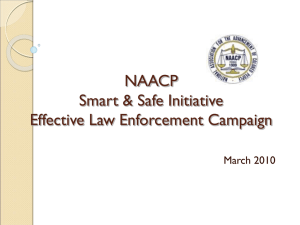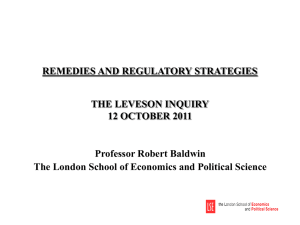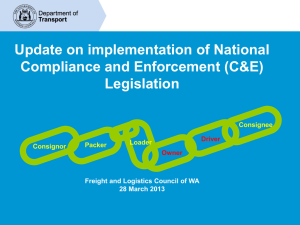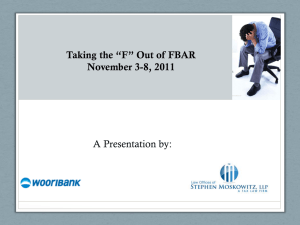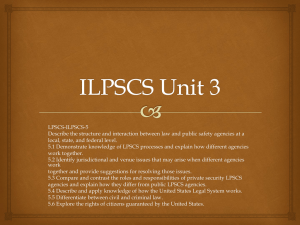Presentation - Dr. Zvi Gabbay
advertisement
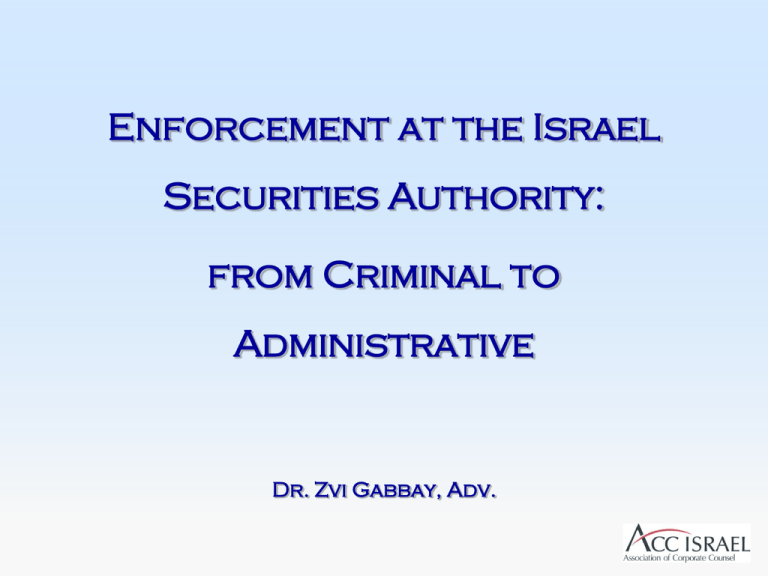
Enforcement at the Israel Securities Authority: from Criminal to Administrative Dr. Zvi Gabbay, Adv. Israel Securities Authority (ISA) – Enforcement Statistics Based on the ISA 2009 Annual Report 14 Criminal Investigations commenced 13 Investigation Files transferred to DA 14 Indictments Filed (19 Files TBD) 11 Court Judgments (7 Trial-Court Verdicts; 4 Appellate Decisions) Enforcement Tools Traditional Enforcement • • • Criminal Enforcement – Commencing investigations and filing indictments Administrative Fines – with respect to certain “technical violations” License Revocation – withdrawing a firm’s authorization, prohibiting operation in financial services, preventing individuals and firms from performing regulated activities. Alternative Enforcement • • • Internal Investigations and applying high corporate governance standards Voluntary disclosure to public and the ISA Unofficial Warnings Enforcement Challenges Efficacy limitations of the justice system • Complexity of securities and financial market issues • Length, costs and consequences of judicial proceedings Lack of effective and appropriate alternatives • Administrative fines apply only to a narrow and limited type of violations Lack of sufficient human resources Selective Use of Criminal Proceedings Internal Costs – intelligence, investigation, prosecution, judicial resources External Costs - defense costs, reputation damage, personal price Many Securities-related violations go unanswered Limited effectiveness of private enforcement Risk of damaging public faith in financial market Israel Securities Authority Enforcement Improvement Law (2011) Declared goals: • Increase enforcement and enhance deterrence • Reduce the time gap between violation and sanction • Match the severity of the violation to the egregiousness of the offense • Use criminal proceedings only in appropriate and distinctive cases Israel Securities Authority Enforcement Improvement Law (2011) New reality post-ammendment - the law provides three types of enforcement actions: • Criminal Proceedings • Expanded Administrative Enforcement – an Administrative Tribunal will be authorized to render a variety of sanctions • Administrative Fines Administrative Fines • Fines to be imposed on individuals, not only on corporations (up to 20% of maximum fine possible for companies) • Codifying procedure Right to hearing Alleged violator to respond within 30 days Limitation periods Discretion to reduce fine Administrative Enforcement Tribunal • Comprised of experienced legal professionals and financial market professionals • Tribunal will sit in panels of three, chaired by an appointed ISA staff member • All non-ISA members will be appointed by the Minister of Justice Characteristics of the Expanded Administrative Enforcement • Administrative enforcement precludes criminal proceedings or administrative fines based on the same matter • A non-adversarial proceeding, generally based on documentation • Evidence rules do not apply; the tribunal will determine its own procedures. • Tribunal will not be authorized to make factual determinations regarding willful intent; it is restricted to negligence at the most. • Tribunal decisions will contain detailed reasoning and will be published on the ISA website. Characteristics of the Expanded Administrative Enforcement – con’t • Confidential proceeding • Enhanced judicial review • Limitation periods: a) Severe violations – 7 years from time of conduct b) Intermediate violations – 5 years from time of conduct c) Lesser violations – similar to Administrative Fine – 3 years from time of conduct or 1 year from time ISA became aware of conduct • Exceptions: disgorgement – always 7 years; revoking license / permit – no SOL. • Indirect responsibility for any corporate wrongdoing – only on CEO, not board members. Expanded Administrative Enforcement - Sanctions 1. Monetary fines 2. Compensatory disgorgement 3. Order to remediate and implement preventive measures 4. D&O Bar 5. License revocation 6. Suspended sanctions Settled Remedial Orders • ISA Chairman, with administrative tribunal approval, may enter into an agreement with violator imposing sanctions on violator. • A Settled Remedial Order replaces previous or future enforcement actions based on the same matter. • Violator’s consent, including any evidence submitted in the course of negotiating the settlement, is inadmissible in criminal or administrative proceedings against him, based on the same matter. Note: inadmissibility does not apply to civil proceedings. • Settled Remedial Orders will be posted on ISA website. • District Attorney will be authorized to enter into such an agreement in criminal cases. THANK YOU

